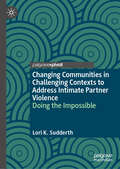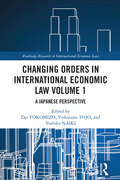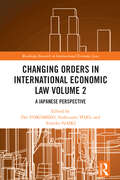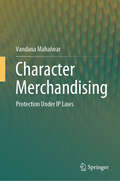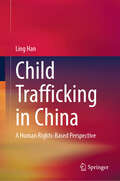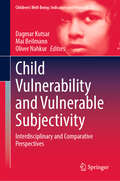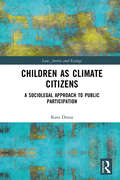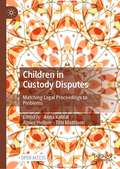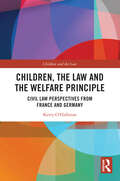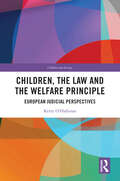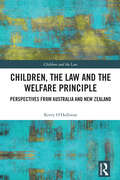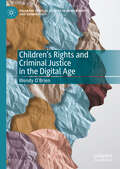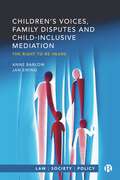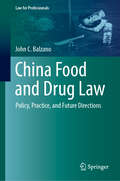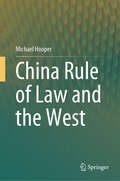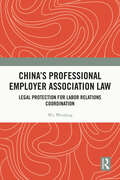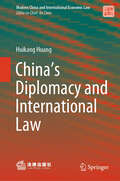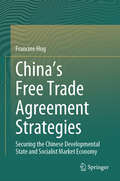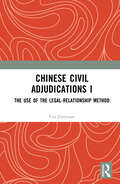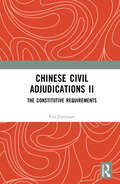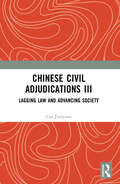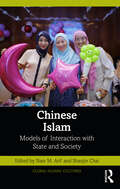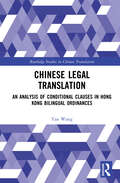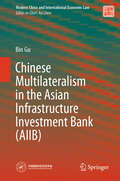- Table View
- List View
Changing Communities in Challenging Contexts to Address Intimate Partner Violence: Doing the Impossible
by Lori K. SudderthWomen around the world face substantial barriers to reporting their victimization, and in some contexts, the classical criminal justice response to violence can be muted, corrupted, or even inappropriate. This book discusses the strategies and efforts of advocates and activists to support survivors of intimate partner violence in isolated, rural, tribal and poor communities. It asks questions such as: how do you create safe space for survivors of intimate violence in places where people tend to know each other? And how do you create safe space for survivors in places with few resources or where tribal identity is key to mental health? Drawing on research from the Caribbean, Central America, and New Zealand, this book speaks to criminologists, social workers and those working with victim advocacy communities, on college campuses, and to policymakers who serve rural or tribal areas.
Changing Orders in International Economic Law Volume 1: A Japanese Perspective (Routledge Research in International Economic Law)
by Dai Yokomizo Yoshizumi Tojo Yoshiko NaikiThese two groundbreaking volumes look at complex legal issues in the changing global economy from the perspective of Asia and/or Japan. Contributors scrutinize the past, present, and future and discuss what the global legal order in economic fields could be like by navigating uncertain and turbulent times. The books address six main themes: (1) Polarization and diversification of values, progress of regionalism and restructuring of multilateral rules, (2) Full-scale arrival of the digital economy and its impact, (3) Empowerment of private persons/entities, (4) Reconsideration of the concept of “territorial jurisdiction”, (5) Law of national security and rule in emergency situations, and (6) Values of Sustainable Development Goals (SDGs) in trade and investment liberalization rules. The book also examines various legal problems under the COVID-19 crisis and suggests how the post COVID-19 global economic order will be from the perspective of Asia and/or Japan. This comprehensive insight will shed light on the intertwined and complex phenomena of the world economy and allow readers of business law and international law to have a better understanding of this volatile era.
Changing Orders in International Economic Law Volume 2: A Japanese Perspective (Routledge Research in International Economic Law)
by Dai Yokomizo Yoshizumi Tojo Yoshiko NaikiThese two groundbreaking volumes look at complex legal issues in the changing global economy from the perspective of Asia and/or Japan. Contributors scrutinize the past, present, and future and discuss what the global legal order in economic fields could be like by navigating uncertain and turbulent times. The books address six main themes: (1) Polarization and diversification of values, progress of regionalism and restructuring of multilateral rules, (2) Full-scale arrival of the digital economy and its impact, (3) Empowerment of private persons/entities, (4) Reconsideration of the concept of “territorial jurisdiction”, (5) Law of national security and rule in emergency situations, and (6) Values of Sustainable Development Goals (SDGs) in trade and investment liberalization rules. The books also examine various legal problems under the COVID-19 crisis and suggest how the post-COVID-19 global economic order will be from the perspective of Asia and/or Japan. This comprehensive insight will shed light on the intertwined and complex phenomena of world economy and allow readers of business law and international law to have a better understanding of this volatile era.
Character Merchandising: Protection Under IP Laws
by Vandana MahalwarThis book addresses the key issues, challenges and implications arising out of unauthorised acts of character merchandising. It offers deep insights into the philosophical justifications for the protection of persona. The book examines what qualifies as a character and its legal rights, namely property rights, personality rights and publicity rights. In the absence of any explicit statutory protection of characters, this work provides new insights into how intellectual property laws can be used to prevent unauthorized character merchandising. It critically evaluates various tests introduced by courts to determine the copyrightability of characters. It also analyses the dicta of the different courts justifying the effective protection of the rights of publicity. Since there is no uniform standard for the recognition and protection of image rights, this book presents a global perspective and developments on the subject with the help of judicial decisions. Drawing on the diverse judicial treatments, it explores whether an exclusive legal approach is required to address the concerns that emerge from unauthorised character merchandising. The book is of immense interest for researchers, academicians, policy makers and practitioners who work in this area. For researchers and academicians, the book offers new insights on how IP laws can be used to prevent unauthorized exploitation of persona. For practitioners, it provides an effective and more consistent approach to the interpretation of international intellectual property instruments. For policymakers, the objectives of protecting the legal rights of characters, is of specific interest. The book will further be of interest to governmental organizations and NGOs who want to advance their lawful merchandising agendas.
Child Trafficking in China: A Human Rights-Based Perspective
by Ling HanThis book provides a comprehensive view to those who are interested in human trafficking, child trafficking, and child protection in China. Based on over 2000 case laws from 1990 to 2020, this book provides an in-depth analysis of the causes, criminal patterns, and consequences of child trafficking happened in 30 provinces in China. It reveals a phenomenon that has not attracted much attention at the international level -- the trafficking of children, intranational and transnational, for resale and illegal adoption.
Child Vulnerability and Vulnerable Subjectivity: Interdisciplinary and Comparative Perspectives (Children’s Well-Being: Indicators and Research #27)
by Dagmar Kutsar Mai Beilmann Oliver NahkurThis book explores child vulnerability in various contexts from a cross-country, comparative perspective. It shows how vulnerability in childhood develops within subjects in relationships with other people (other children, parents, specialists, such as teachers, social workers, and judges), how it is created by welfare, health care, education, and justice systems, and is empowered by multiple crises, such as the COVID-19 pandemic, wars and natural disasters. The authors hope to enhance dialogue between childhood studies and children’s rights studies through these discussions. The role of children’s agency and autonomy, including their right to participate in decision-making processes related to their own life, has a special emphasis in this book. Importantly, the book discusses ethical considerations and challenges connected to the participation of vulnerable children in research. It also adds insights into domain-based child vulnerability, particularly through participatory action research with extremely vulnerable children with traumatic pasts in Estonian substitute care and Ukrainian children with refugee status in Estonia. The book thereby provides deep insights into the ways to increase child well-being by decreasing vulnerabilities and building resilience. It combines approaches from psychology, sociology, law, educational sciences, social work, and media studies, and is an important resource for academics as well as practitioners and policy-makers working on children's well-being.
Children as Climate Citizens: A Sociolegal Approach to Public Participation (Law, Justice and Ecology)
by Kata DozsaThis book provides a socio-legal analysis of the public participation of children in climate change matters, whilst developing a range of tools through which their participation can be increased. Climate change affects young people in many ways: causing severe threats to child survival, health and wellbeing, food security and nutrition, and access to education. But this book maintains that children and youth are not to be identified solely with their vulnerability to climate change. They are also key stakeholders in the sustainable implementation of long-term climate change policies, and their inclusion in decision-making processes is a measure of intergenerational equity. Children’s rights law is vague about the right to public participation or the environmental rights of children as such. In response, this book examines the often-informal network of pathways through which the public participation of children takes place: from high level conferences and governance structures to grassroots youth movements and climate change litigation. Exploring the difficulties, but also the opportunities and aspirations of children as citizens challenging the current climate change regime, the book proposes legal and policy tools for children’s participation in global climate change governance, as it outlines a concept of children’s climate citizenship. This book will appeal to scholars in the areas of sociolegal studies, environmental and climate change law, children’s rights and social movements, as well as policy makers and young people with interests in climate activism.
Children in Custody Disputes: Matching Legal Proceedings to Problems
by Anna Kaldal Titti Mattsson Agnes HellnerThis open access book explores how legal proceedings in and out-of-court can be matched to the complex problems underlying disputes concerning child custody, residence and contact between parents. It focusses in particular on Nordic experiences of in and out-of-court mechanisms as means of resolving custody disputes. The contributors are internationally renowned and experienced researchers from the legal, psychological, and sociological fields who provide empirical as well as legal perspectives. They examine central legal, ethical and knowledge-based dilemmas in custody dispute proceedings. The findings speak to an international audience and suggest ways how to best realize the interests of the child. It transcends disciplinary, institutional, and jurisdictional boundaries in search of new knowledge.
Children, the Law and the Welfare Principle: Civil Law Perspectives from France and Germany (Children and the Law)
by Kerry O'HalloranThis book contrasts and compares the different application of the law relating to the welfare interests and rights of children in France and Germany. It does so by applying the same matrix of indicators to explore jurisdictional differences between welfare interests and rights in the contexts of public family law (civil – care and protection etc and criminal – youth justice etc); private family law (matrimonial, adoption etc); and hybrid public/private family law (wardship, adoption from state care etc). By profiling the nations in accordance with the same indicators it reveals important jurisdictional differences in the extent to which welfare interests or rights determine how the law is currently applied to children in France and Germany. This volume will be of interest to academics and researchers engaged in law, legal studies and social policy, and also to policymakers, administrators, and professionals working within child welfare systems.
Children, the Law and the Welfare Principle: European Judicial Perspectives (Children and the Law)
by Kerry O'HalloranThis book continues the themes addressed by its five predecessors in this series by examining the role of the principle of the welfare interests of the child as addressed in international legislation and by international courts.It provides a record of the key cases in the development of the principle as articulated primarily by the European Court of Human Rights (ECtHR) and complemented by rulings of the Court of Justice of the European Union (CJEU), and the United Nations Committee on the Rights of the Child (UN CRC). It identifies and assesses themes arising from the many decades of ECtHR cases dealing with issues affecting the welfare interests and rights of children as referred to the Court from the 46 Member States that comprise the Council of Europe. By differentiating between the functions of the welfare principle and those of children’s rights – in the public (care, protection, and control), in the private (matrimonial, adoption, etc.), and in the hybrid (adoption from state care, etc.) sectors of family law – it reveals how the law relating to children is changing across Europe. By examining the international framework of legislation and related caselaw it identifies and assesses the themes in that law as they have unfolded over time.In addition to a digest of international cases and legislation – that identifies and tracks the role of the welfare principle and the emerging rights of children – lawyers, academics, and other researchers will find a wealth of information on how the law has evolved to reflect corresponding changes in social mores. For those interested in politics and social policy, there is much illuminating evidence on how the law has balanced this principle relative to others – such as proportionality and subsidiarity – within both civil and criminal contexts.
Children, the Law and the Welfare Principle: Perspectives from Australia & New Zealand (Children and the Law)
by Kerry O'HalloranThis book contrasts and compares the different application of the law relating to the welfare interests of children in Australia and New Zealand including, respectively, the Indigenous and Māori children of those countries. It does so by applying the same matrix of indicators to explore jurisdictional differences between welfare interests and rights in the contexts of public family law (civil – care and protection etc and criminal – youth justice etc); private family law (matrimonial, adoption etc); and hybrid public/private family law (wardship, adoption from state care etc). By profiling the nations in accordance with the same indicators it reveals important jurisdictional differences in the extent to which welfare interests or rights determine how the law is currently applied to children in Australia and New Zealand.
Children’s Rights and Criminal Justice in the Digital Age (Palgrave Critical Studies in Human Rights and Criminology)
by Wendy O'BrienIn the data economy, childhood is a lucrative commodity. The digital technologies that offer incredible possibilities for children’s enrichment and empowerment also open avenues for their exploitation, denigration, criminalisation, and control. Coming to grips with this paradigm of technological benefits and harms requires a deepened understanding about how children's rights are engaged within a technocratic system that distributes costs and benefits unequally. In the context of the altered flows of data and power in the digital age, Wendy O’Brien argues for a resurgence in the commitment to equal human dignity. Challenging narrow conceptualisations of online risks to children, the book identifies the need to confront the techno-social status quo that accepts harms against children as inevitable. This book will be of interest to legal scholars, criminologists, policy makers and technologists with an interest in upholding children’s rights in the age of AI.
Children’s Voices, Family Disputes and Child-Inclusive Mediation: The Right to Be Heard (Law, Society, Policy)
by Anne Barlow Jan EwingePDF and ePUB available open access under CC-BY-NC-ND licence. Recent legislative changes in England and Wales have eroded children’s ability to exercise their article 12 UNCRC rights to information, consultation and representation when parents separate. However, children’s voices may be heard through child-inclusive mediation (CIM). Considered from a children’s rights perspective, this book provides a critical socio-legal account of CIM practice. It draws on in-depth interviews with relationship professionals, mediators, parents and children, to consider the experiences, risks and benefits of CIM. It investigates obstacles to greater uptake of CIM and its role in improving children’s wellbeing and agency. Exploring the culture and practice changes necessary for a more routine application of CIM, the book demonstrates how reconceptualising CIM through a children’s rights framework could help to address barriers and improve outcomes for children.
China Arbitration Yearbook (China Arbitration Yearbook)
by Yifei LinThis book presents a selection of the latest arbitration cases, materials, and commentaries from China. It aims to provide information on the theory and practice of arbitration combined. It is intended to provide readers with a useful resource to guide them when they encounter actual China-related arbitration cases. This book is a valuable resource for all practitioners concerned with international and foreign-related arbitration matters in China, global law firms, companies engaged in multinational business, jurists, and academics.
China Food and Drug Law: Policy, Practice, and Future Directions (Law for Professionals)
by John C. BalzanoThis book is an analysis of policy and law governing the development, approval, manufacture, distribution, marketing and post-market surveillance of human drugs, medical devices, foods and cosmetics in Mainland China (“China FDD Regulation”). It analyzes the policy and general principles behind China FDD Regulation, including the history and jurisdiction of the central and local agencies that administer the laws and regulations, the administrative law structure in which these agencies operate, and other aspects of FDD Regulation interpretation and enforcement. Although it describes practice in China, this book is written in the comparative perspective (i.e., sensitive to assumptions made by those who are steeped in FDD Regulation in the U.S., Japan, and the EU). It includes one chapter on each regulatory space (drugs, medical devices, cosmetics, and food) organized by the lifecycle of products. It also covers subcategories of products, such as vaccines, radiopharmaceuticals, and in vitro diagnostic medical devices. The book includes specialty chapters on areas that are common to multiple types of regulated products, such as biosecurity and advertising. It is the first English language book of its kind, and it can serve as a resource for those in the FDD law and regulatory field to understand the mechanics of developing and marketing products, but also with insights for businesspeople and others, who are developing China-strategies.
China Rule of Law and the West
by Michael HooperThis book reveals how the Chinese Party-State uses "ideo-political education" to inculcate young citizens with official narratives on law. It provides an account of China's version of "rule of law" under the Yifa Zhiguo paradigm, arguing that authorities see law as a tool to apply when convenient and ignore when it impedes Party-State goals. Moving beyond the question of whether China's system can count as a rule of law order, this book identifies three consistent features of Chinese law reform since the Opening and Reform era began: the supremacy of the Communist Party of China over the law, instrumentalism, and reform-repression dualism. This book uniquely combines the "what" with the "how" of China's "rule of law" efforts. China law researchers will benefit from understanding how China's young adults learn about official law narratives. A more general audience interested in China's legal and political system will gain valuable insights from the analysis of China's "rule of law." The growing tensions between China and the West mean that now, more than ever, scholars and policymakers need to properly understand China. Understanding what Chinese officials mean when they talk about the rule of law in China helps avoid policy errors made from mistakenly assuming that Western definitions are universal. The contents of this book can also inform government and university efforts to properly accommodate Chinese students in the West while mitigating harmful manifestations of the nationalist ideology, in part implanted by ideo-political education.
China's Professional Employer Association Law: Legal Protection for Labor Relations Coordination
by Wu WenfangThis book studies the coordination mechanism of labor relations from the perspective of China’s law on employer association.The first part of the book examines the definition, functions, and institutional basis of employer associations in different types of labor relations, focusing on the complementarity between the law and the coordination mechanism of labor relations in the context of different social environments, institutional frameworks, and their different responses to deregulated labor policies. It then reviews the legislation, responsibilities, and institutional guarantees of employer associations in modern China. The second part outlines the current limitations of legal resources in terms of subject matter, participation mechanisms, and participation channels that constrain the coordination of industrial relations by China’s employer associations. The author emphasizes that the systematic legal safeguards of employer associations should be function-oriented and gradually established in a targeted and differentiated manner.The title will appeal to labor and employment law scholars and legislators, and especially to those interested in the law of employer association.
China’s Diplomacy and International Law (Modern China and International Economic Law)
by Huikang HuangThe book is a tour de force by a world renowned legal expert and senior diplomat. Its main feature is a well-balanced integration of diplomatic thinking and legal analysis, based on the 70-year diplomatic theory and practice in China. Rich in content and thought provoking, it systematically discusses the international law issues faced by China in the development of major country diplomacy with Chinese characteristics. The author creatively develops the concepts of Blue Diplomacy to refer to global ocean governance, Green Diplomacy to deal with climate change, Red Diplomacy to cope with anti-corruption, Digital Diplomacy for cyberspace governance, each with amplified amount of cases and materials. The author also deliberates the “one country, two systems” policy and the building of “community with shared future of mankind”. The book helps the readers to better understand the fundamental principles and policies of China's diplomacy. For students, it is a key that opensup the door to international law studies; for researchers, it is a rich mine of international legal issues; for diplomats, it is a valuable guidance to master the art and science of legal diplomacy.
China’s Free Trade Agreement Strategies: Securing the Chinese Developmental State and Socialist Market Economy
by Francine HugThis book delves into the intriguing paradox of China's position in international trade law. Although China is an active member of the World Trade Organisation (WTO) engaging in substantial trade, tensions with trading partners may also arise. In this context, the book explores the legal principles informing Chinese Free Trade Agreements (FTA) and aims to answer the pivotal question: What drives China's FTA strategies? With unique analytical methods and a novel theoretical framework, this book sheds light on China's FTA strategies, challenging prevailing notions about State intervention in the economy and offering a nuanced perspective on China’s position in the world trading system. By exploring how Chinese FTAs align with developmental State and socialist market economy principles, the book contributes significantly to the fields of international economic law generally, and Chinese law specifically. Readers, especially those interested in international trade law and China's economic policies, will benefit from gaining a deeper understanding of the principles guiding China's FTA strategies and their contrast with leading liberal regimes like the WTO, the United States, and the European Union. This thought-provoking and pioneering book presents a fresh perspective on China's role in the global trade landscape. It is thus an essential resource for anyone curious about the interaction between China’s distinctive political economy and the transforming international economic order.
Chinese Civil Adjudications I: The Use of the Legal-Relationship Method
by Cui JianyuanAs the first volume of a three-volume set that provides critical reviews of typical civil cases in China, this book focuses on the methodology of legal relations and their importance in adjudication.It is crucial to identify and determine the specific legal relationship that encompasses certain civil rights or obligations. This allows for the application of appropriate or analogous legal norms. By using these norms, along with the entire body of law or rule of law, it becomes possible to identify all the civil rights and obligations within that legal relationship and to understand their interrelationships. This leads to the proper handling of controversial cases. In the nine cases discussed in this volume, the method of legal relations was overlooked to varying degrees. Therefore, an important goal of this volume is to encourage both legal practice and theoretical research to take note of and implement the methodology of legal relations.The book will appeal to scholars and students interested in China's civil litigation, civil law system and judicial reform, and comparative law.
Chinese Civil Adjudications II: The Constitutive Requirements
by Cui JianyuanAs the second volume of a three-volume set that critically reviews typical civil cases in China, this book focuses on the importance of constitutive requirements of legal rules.A legal rule consists of constitutive requirements and legal effects. The constitutive requirements should trigger specific legal effects and not lead to unintended consequences. If they do not, the application of a legal rule may not produce the desired result. Any change in the constitutive requirements should result in a corresponding change in the legal effects. A mismatch between the two can lead to unfairness and injustice. In the nine cases discussed in this volume, these principles were either seriously overlooked or given insufficient attention, with various negative consequences.The book will appeal to scholars and students interested in China's civil litigation, civil law system and judicial reform, and comparative law.
Chinese Civil Adjudications III: Lagging Law and Advancing Society
by Cui JianyuanAs the final volume of a three-volume set that critically examines typical civil cases in China, this book focuses on resolving conflicts between outdated laws and an advancing society.Laws may become obsolete over time, or their relevance may be greatly diminished. With social changes and changes in the social system, it becomes inevitable to update laws. In China's reform and opening-up era, the social relations governed by civil and commercial laws are constantly evolving, resulting in noticeable changes. However, the enacted and effective civil and commercial laws may not immediately keep pace with these changes. Against this background, it may not always be appropriate to apply the law mechanically, especially in individual cases. Judgments in particular cases may be based on the details of those cases, guided by fundamental principles, and may disregard certain specific provisions in order to achieve fairness and justice. Some of the nine cases discussed in this volume have successfully practiced these principles, but most still have room for criticism and improvement.The book will appeal to scholars and students interested in China's civil litigation, civil law system and judicial reform, and comparative law.
Chinese Islam: Models of Interaction with State and Society (Global Islamic Cultures)
by Nasr M. Arif Shaojin ChaiThis book explores the fascinating and complex histories of Islam and China. Meticulously researched and captivating, it provides a comprehensive history of the encounters and relationship between these two great civilizations, as well as the unique development and indigenization of Islam within China.The work looks at the early interactions between Arab Muslim traders and the Tang dynasty in the seventh century, shedding light on the establishment of the first Muslim communities in China. The narrative then progresses through subsequent dynasties, examining the ebbs and flows of Muslim influence, integration, and indigenization. It looks at the emergence of the Hui and other Muslim ethnic groups, who play a central role in the story of Chinese Islam. By delving into their customs, beliefs, and distinctive practices, the authors unveil the intricate process of indigenization, where Islam becomes deeply rooted in Chinese culture and society. One of the unique features of this collection is the nuanced analysis of the impact of major political events, as well as gradual social changes, on the process of adoption and transmission of Islam in China. The authors also highlight the role of economic activities, Chinese Islamic scholars, and key architectural landmarks in this multifaceted history.Part of the Global Islamic Cultures series that looks at integrated and indigenized Islam, this book will be of interest to students and researchers of religion, Islamic studies, religious history, political Islam, cultural studies, Islamic law, and Asian studies. It will also be useful to readers who are interested in world religions, theology, and cultures.
Chinese Legal Translation: An Analysis of Conditional Clauses in Hong Kong Bilingual Ordinances (Routledge Studies in Chinese Translation)
by Wang YanChinese Legal Translation analyses and investigates the Chinese translation of conditional clauses introduced by various introductory words in Hong Kong bilingual ordinances within the framework of descriptive translation studies and translation typology. This book explores the text typology of Hong Kong bilingual ordinances and highlights differences and similarities between different translations of conditional clauses in the Hong Kong context. Based on both quantitative and qualitative analysis of conditional clauses of the Companies Ordinance, the book summarises the frequency of introductory words of conditional clauses and generalises guiding patterns for writing conditional clauses and translating conditional clauses. The book is significant in providing both theoretical foundations for legal translation and practical guidance for translating legal conditional clauses. This book is primarily targeted for scholars and professionals who are interested in legal writing and legal translation, as well as for students and practitioners in legal translation.
Chinese Multilateralism in the Asian Infrastructure Investment Bank (Modern China and International Economic Law)
by Bin GuThis book reflects the latest legal development of the Asian Infrastructure Investment Bank (AIIB), and makes direct and positive responses—it uses first-hand, authoritative information and makes insightful and persuasive analyses in addressing those concerns.In particular, this book provides nuanced analysis of the following topics:— capital allocation of the AIIB, in comparison with those of Bretton Woods institutions;— dynamic relationship between the shareholder board and management, a central topic of corporate governance for the AIIB and other MDBs;— AIIB’s environmental and social safeguards, including its frontier ESG portfolio investments, in comparison with the World Bank standards;— highly debatable issues relating to the interaction between AIIB, Belt and Road, and MCDF;— comparative study of state-owned enterprises in the laws of AIIB, WTO, ICSID, etc..This book targets academics, students, policymakers, and businesscircles who are interested in AIIB, given the bank’s growing importance in the context of global economic governance reforms. First, the book is a must for those who are keen to gain insight into the AIIB. Ten years have passed since the debut of the idea of AIIB in 2013, and the topic has never retreated from the debate of the international community—a major concern is whether a China-led multilateral development bank (MDB) remains to be politically neutral, or professional, and can live up to high standards.
